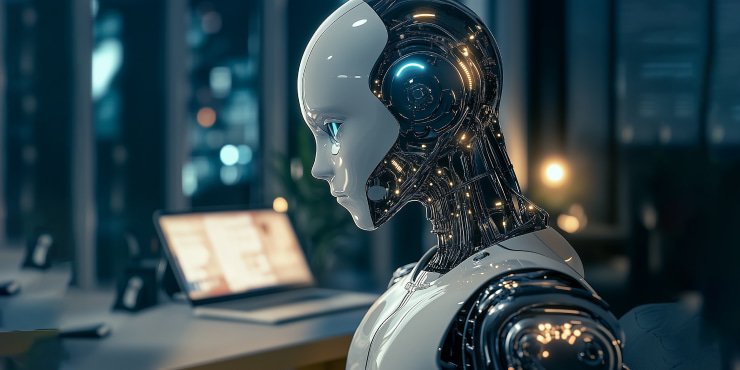Artificial Intelligence (AI) once seemed like a far-off concept belonging to science fiction stories, filled with robots and futuristic cities. Today, however, AI is no longer just the subject of imagination—it’s become an integral part of our daily lives, often operating in the background without us even noticing. From waking up to a voice assistant like Siri giving you the weather report, to receiving a movie recommendation on Netflix or a playlist on Spotify tailored to your taste, AI is working behind the scenes to make everyday tasks more convenient and personalized.
AI is also helping people navigate the world with greater ease. Whether you\'re using a GPS app that adjusts your route in real time based on traffic conditions, or searching for answers online with smarter, more accurate results, AI is involved in improving the efficiency of modern life. Even email services now use AI to filter spam, organize messages into categories, and suggest short replies—all in the blink of an eye. These small conveniences add up, saving time and reducing mental clutter.
Beyond personal use, AI is having a huge impact on the way businesses operate. Companies, both big and small, are using AI tools to streamline operations and increase productivity. One of the most common uses is in customer service, where AI-powered chatbots can answer questions 24/7, solve common problems, and direct customers to the right resources—all without the need for human intervention. This not only saves time but also improves the customer experience by reducing wait times and ensuring consistency in responses.
Data analysis is another area where AI shines. In the past, sorting through massive amounts of data could take days or weeks. Now, AI systems can process and analyze large datasets in seconds, uncovering trends, patterns, and insights that would otherwise go unnoticed. This allows businesses to make faster, more informed decisions. Predictive tools powered by AI can help companies forecast future demand, personalize marketing campaigns, and even detect potential security threats or fraudulent transactions.
What’s more, AI isn’t limited to high-tech companies. Small businesses, startups, and even individual entrepreneurs are finding ways to harness AI. From generating content ideas for blogs to optimizing social media ads and tracking customer behavior, AI tools are helping level the playing field. These tools offer powerful capabilities that were once out of reach for anyone without a large budget or a team of data scientists.
In the world of healthcare, the impact of AI is especially significant. AI is being used to help doctors diagnose illnesses faster and more accurately. By analyzing x-rays, lab results, and patient medical records, AI systems can detect patterns that may be too subtle for the human eye. This technology is especially valuable in detecting conditions like cancer, where early diagnosis can make a life-saving difference. Importantly, the goal of AI in medicine is not to replace doctors or nurses, but to support them by reducing workloads and giving them better tools to deliver quality care.
Despite all these benefits, it’s important to acknowledge that AI also brings challenges and concerns. One major issue is privacy—AI systems often require access to personal data in order to function effectively, which raises questions about how that data is collected, stored, and used. There’s also concern about job displacement, especially in roles that are easily automated. Many people worry that machines might take over tasks traditionally done by humans, leaving some workers behind.
Another critical issue involves ethics and accountability. As AI becomes more capable of making decisions—such as who gets approved for a loan or how long someone should stay in prison—people are rightly asking who is responsible if something goes wrong. Experts, governments, and tech leaders around the world are currently working to create ethical guidelines and regulations to ensure AI is used in a fair and transparent way. The goal is to build systems that enhance society without causing harm or increasing inequality.
Even with these concerns, there’s no denying that AI is here to stay. Its presence is growing in nearly every area of life, from education and entertainment to transportation and finance. Many of the things we once thought were far in the future—like self-driving cars or virtual assistants that understand natural language—are now becoming a reality. And as AI technology continues to advance, its potential to make life easier, more efficient, and more connected will only increase.
In the end, AI is a tool—one that can be used for both good and bad, depending on how it’s managed. As we continue to adopt this powerful technology, it’s crucial that we remain thoughtful about its use. With the right balance of innovation and responsibility, AI has the potential to bring about positive change in countless ways. What once felt like a science fiction dream is now shaping the real world, one algorithm at a time.


















Samuel Boafoh
one algorithm at a time
IDDRISU ABDUL WARIS
T
Samforex
Good
Erry123
Great
Keydonn
Good